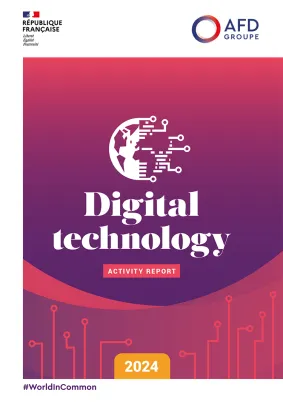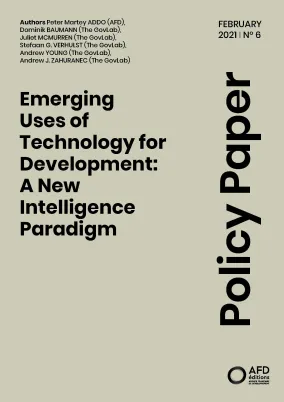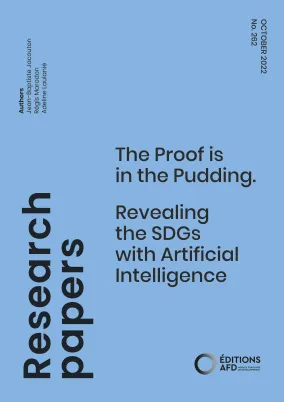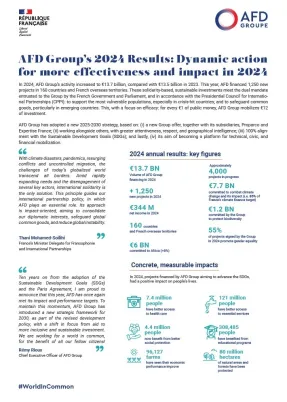Share the page
How can we ensure equitable technological development in the age of AI and data?
Published on

Significant investment is essential to bridge the global technology gap and ensure that all countries are prepared for the age of Artificial intelligence. To support public and private investors in this effort, Agence Française de Développement (AFD) has developed a groundbreaking tool: the Artificial Intelligence Investment Potential Index (AIIPI).
Article published for the first time on 20 November 2024 and updated on 28 January 2026
There are fewer than five years left to achieve the Sustainable Development Goals (SDGs). However, according to the latest United Nations report published in July 2025, only 35% of them are currently on track. This slow progress stems from various challenges, including climate change, geopolitical tensions, and health crises.
Another critical, often overlooked factor is the lack of reliable data. In many countries in the Global South, insufficient digital infrastructure, unreliable data, and limited access to information hinder progress. However, data is a cornerstone of sustainable development: it enables informed decision-making in public policy and private investment, facilitates the identification and reduction of inequalities, and allows faster, more effective responses to crises.
AIIPI reveals countries' AI Investment Opportunities
As a technology based on the massive exploitation of existing data, AI is raising hopes. It could help to achieve some of the SDGs, for example in energy management and education.
However, the potential benefits of AI are unevenly distributed: in some countries, access to technology, funding and skilled labour remains limited. "To bridge the technology gap and make countries truly 'AI-ready,' significant investment is required. This includes ensuring universal access to electricity, developing cloud infrastructure, implementing training programs to build critical skills, and strengthening digital infrastructure," says Peter Addo, artificial intelligence expert and head of AFD's Emerging Tech Lab.
To guide these investments, AFD has developed the Artificial Intelligence Investment Potential Index (AIIPI). This index classifies countries into four groups, corresponding to different stages of "investment potential". "On the methodology front, we assessed digital infrastructure, technological development, AI openness, political stability, and economic attractiveness. This was based on key indicators such as access to electricity, connectivity, GDP per capita, government effectiveness, the human capital index, as well as the presence of a national AI strategy and data protection measures," explains Peter Addo. The AIIPI dataset is now available online under a Creative Commons on the Open Platform for French Public Data.
Each group has different needs: while advanced economies need to focus on AI innovation and regulatory frameworks, emerging and developing economies need to prioritize infrastructure and skills development. "The results for Africa highlight the need for targeted investment to enhance the continent's attractiveness in AI. However, this requires a tailored approach to address the varying needs of different countries. For example, Morocco, Egypt, Senegal, and Kenya have already reached stage 3," emphasizes Peter Addo.
"It is a new tool designed to guide both public and private investment decisions, addressing countries' AI needs and fostering inclusive, sustainable growth," he adds. The AIIPI has been presented on November 20 by AFD’s Chief Economist Thomas Melonio at the 12th International Monetary Fund Statistical Forum, focused on measuring the implications of AI on the economy.
Towards the ethical use of data
Nevertheless, the rapid development of AI can also be fraught with risks: badly exploited, it can exacerbate inequalities or raise transparency and human rights concerns. "Datafication has transformed many aspects of our lives into data, yet we are not always well informed about the types of data collected or their subsequent use", explains Anastésia Taïeb, innovation officer and research assistant at AFD. This generates not only individual mistrust but also, more broadly, asymmetries between players in terms of access to and use of data.
This is where the ethical re-use of data comes in. A report co-authored with The Data Tank proposes a tool: the "social licence". Inspired by the "social licence to operate" (SLO) used in the mining sector, this mechanism requires companies to involve the populations affected by the project. "By restoring balance between stakeholders, this type of license helps protect individuals—and, more broadly, communities—that contribute data, involving them in the data collection and usage process," explains Peter Addo.
The communities themselves can then use this data to meet their own needs. In Senegal, for example, the ethical re-use of data has made it possible to implement a climate warning system using census data. This example, among others, shows that the re-use of so-called "non-traditional" data (in other words, data not collected by statistical institutes: satellite images, street maps, etc.) and the adoption of social licenses can improve environmental governance, empower communities and accelerate action on climate change and the SDGs.




